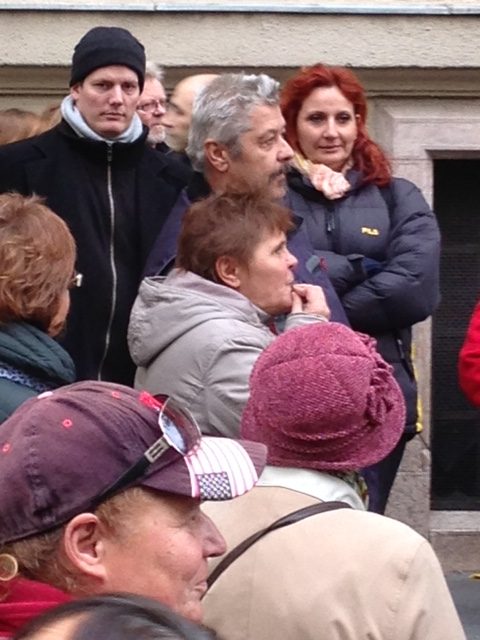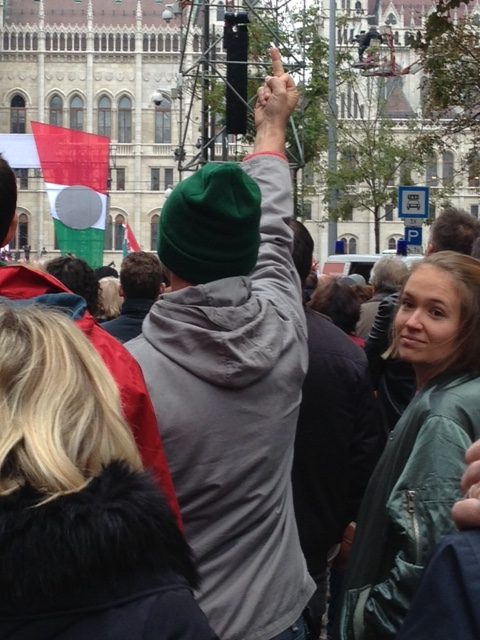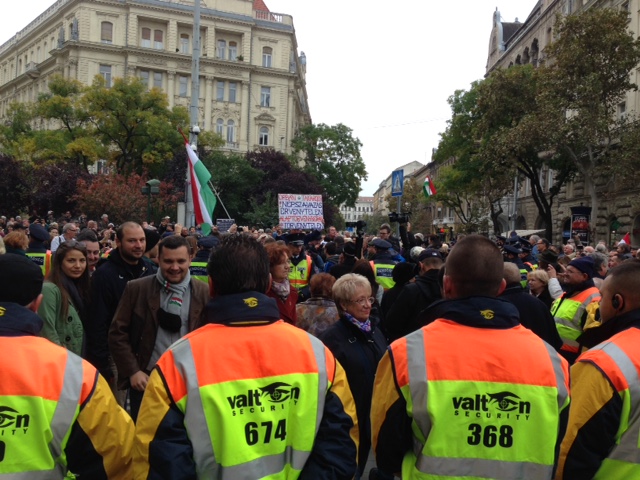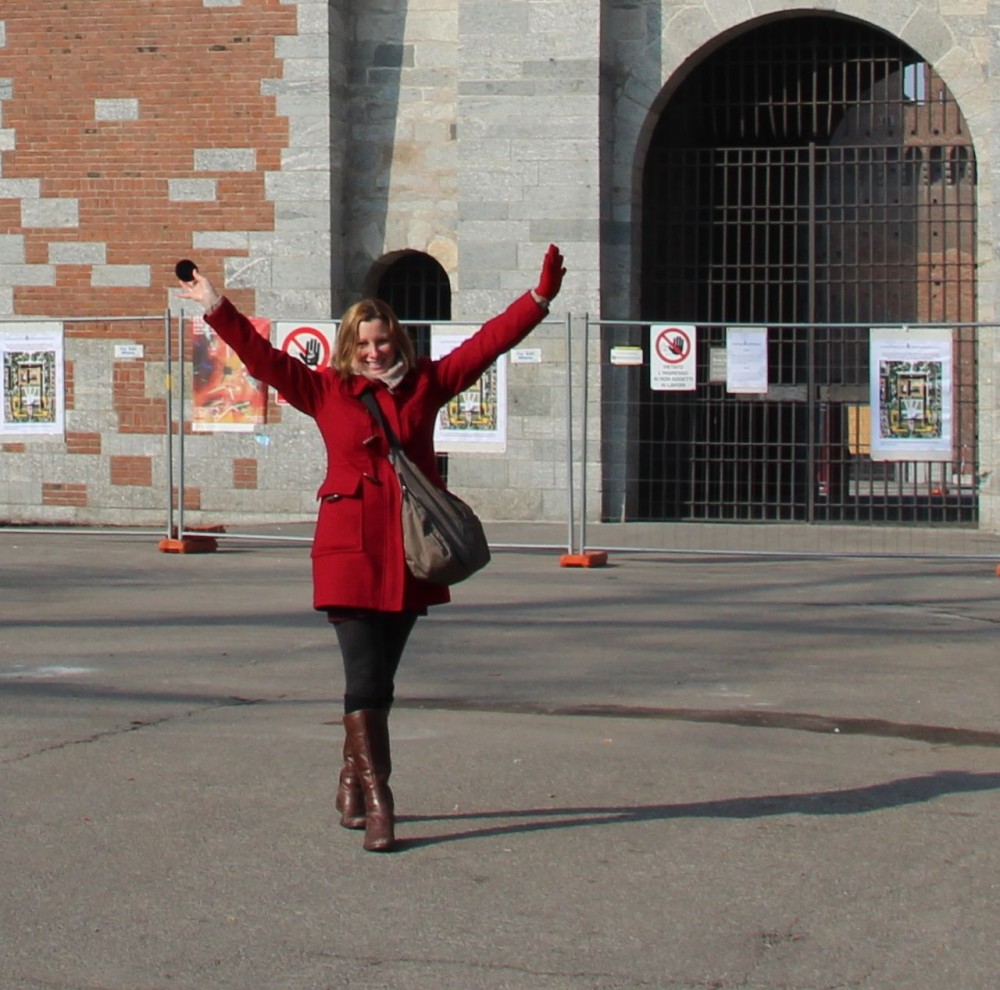October 23, 1956, is a day that will live forever in the annals of free men and nations. It was a day of courage, conscience and triumph. No other day since history began has shown more clearly the eternal unquenchability of man’s desire to be free, whatever the odds against success, whatever the sacrifice required. – John F. Kennedy
1956 revolution is a very important part of world history. The citizens of a tiny country stood up against a repressive, fierce super power to try to gain their freedom. They used old guns, makeshift weapons, homemade bombs, and threw stones while fighting against the fully armed Soviet army.
This is a classic story of David and Goliath except this time David was annihilated, triggering 200,000+ people to escape the brutal clutches of the Soviet Union, leaving the Hungarian people to scatter to every corner of the world to find safety.
My Grandmother will be 96 years old this year, the last of our family to truly REMEMBER the revolution, her reasons for leaving and her personal experiences during communism.
Yesterday, Sunday October 23rd 2016 marks the 60th year anniversary of the day students, teachers and their families started a protest at the radio building in Budapest where they tried to broadcast their political views against the ruling communist regime. Many citizens joining in as they marched through the streets, which led to 2500 people dying by November 4th 1956 in the streets of downtown Budapest.
The Soviet troops were sent into the city to stop the uprising. The brutality that followed was unmeasurable.
The Soviets stayed in power until 1989; work camps were set up, jails, torture against anyone who remotely said anything against communism. After the revolution it was now a crime to even speak up against the government and the Soviet powers squashed rebels before any possible uprising.
***For those of you wishing to know more about the horrors of living under communist rule please read the post on the Terror Museum, which opened government records to the public on February 24th 2002, a full 14 years after the Soviet troops left Hungary.
Every Hungarian should visit this display to fully understand what the citizens of Hungary had to endure for 65 years.
The Hungarians who left Hungary only got glimpses of what was actually happening back home as our families stuck in Hungary were fearful of telling even their closest family members. The consequences were that grim, and the citizens of Hungary were further terrorized.
Today, we take #49 metro to the 1956 art display at the Budapest National Gallery where they showed photos, paintings, sketches, and drawings from artists who lived through the 1956 revolution and the year that followed.
The lesson of the Hungarian experience is clear – liberty can be delayed but it cannot be denied. The Soviet Union had crushed the Hungarian uprising but not the Hungarian people’s thirst for freedom. – George W. Bush
We were not allowed to take photographs inside the exhibit although we paid for a photo pass.
***just a note that your pass only allows you to take photos in the lobby and outside the exhibitions.
The images show brutal violence, hangings, and war; conveying the feelings of sheer desperation; truly a sad time in Hungary’s history.
- Russian army tank running over protesting students in the streets
- A firing squad line-up lays dead on the side of the road; their felt hats resting silently next to their collapsed corpses
- People piled high in a massive grave; cloaked in their 50’s attire makes them look as if they are only sleeping. It is unreal to think that these are real people in these images; someone’s child, friend, mother, father…
- Kids picked up guns to fight against communism, you can see their excitement in their eyes, they believed they would change the country
- A very stylish, beautiful woman holds a rifle in her small hands with a smoke dangling from their lips; looking very confident. They were standing up against communism and thought they would win
- A marked grave with the birthday of a young 13 years old boy who died fighting for freedom
I overhear a man with his son explaining to him what his parents went through. They were steps ahead of us at the art exhibition. Other parents talked to their kids in Polish and Italian too, and we all told the same story; to never forget, to be grateful that we all had a chance at a better life elsewhere while our relatives who didn’t get out had to endure communism for another 30+ years.
On October 23, 1956, the Hungarian people stood up against tyranny in the name of freedom, bravely rising up to oppose the Communist regime which had been imposed upon them by the Soviet Union. During this uprising, many Hungarians died to defend and advance their country’s freedom and independence. – Barack Obama
We took the yellow Trolley to hear Prime Minister Orban’s speech at the Parliament building. On route we saw the store fronts decorated with war memorabilia, displaying soldier uniforms and army artifacts.
After a sardine packed ride through Budapest to the park, we decided to jump off before the parliament station and walk through the crowded streets. It felt exhilarating to think that we were all going to see and hear the leader of Hungary, and to remember what our grandparents and parents did for us in 1956.
On a large stage with giant screens were projected images and live footage. Kossuth Ter was full of thousands upon thousands of people eagerly awaiting the presentation and to hear Orban.
There was a traditional Hungarian band playing when we arrived, and then a little boy sat in a chair, dressed in 1950’s clothes and he began to read.
The story was about a little boy who lived during the revolution and wrote a daily diary his life. He told us about the tanks rolling in, the mood of the time and the week when the violence took place.
During this reading different people stood up and told their own detailed accounts of the revolution too, how they escaped and some who did not. Some told their family story, others were actors that read from journals; the whole presentation was extremely moving.
It was not about the few political heroes glorified to represent the revolution, but it was time to celebrate the common citizens. Every family has a hero that somehow endured. All our stories have valour and many were sharing them for the first.
Throughout the day I saw tears in the eyes of many people; old men crying, women hugging their husbands crying into their shoulders. I could feel their pain thinking about my own family and their struggles.
My grandfather couldn’t even talk about Hungary without taking out his handkerchief and wiping his eyes.
Today I remember my own hero, my Giricz Nagypapa.

Did you hear him despite the whistling protesters? A friend asked me…
We could hear the memorial service and the speech through the whistling protesters, except when this one lady who would not stop standing beside us. I listened to her talk to people who tried to get her to shut up during the national anthem so they could hear. She was very angry, and her husband nearly got into a fist fight on more than one occasion as we listened to Orban’s speech.
What does one thing have to do with the other?
You don’t have to love Orban or his politics to go to the 1956 revolution memorial, but I think the OPPOSITION PROTEST during the event was disrespectful to our forefathers.
Why did the opposition party protest during the 1956 commemorative ceremony? I felt they used the crowds to push their own political agendas,a nd perhaps it was ill timed. More annoying for those Hungarian refugees who made their way home perhaps for the last time to share in the celebrations; veterans in their eighties and nineties who made the trip specifically to remember 1956.
Ten years ago the opposition did the same thing and they managed to completely ruin the ceremony. This was their hopes again.
Orban talked about the 1956 revolution and how Poland went through a similar protest in early October 1956 when workers were demanding better working conditions. 10,000 troops and 400 tanks rolled into Poland to disperse the 100,000 protesting citizens. Although their casualties were not as high as in Budapest, we share in the brotherhood of rebelling against the Soviet powers, fighting for a common goal.
“Before the risk was lies about 1956, now the risk is disinterest”
Orban’s publicity campaign for the remembrance day celebrations were targeted towards Hungarian youth, hiring American/Hungarian songwriter Desmond Child to create a song for us to remember.
It was less politically charged going this route having the theme of the commemoration geared towards music and personal accounts of the time.
‘Our responsibility is to prevent Brussels from Sovietizing,’ said the Hungarian leader.
Lest we forget! The next generation may not remember the revolution or communist rule. Yet we all may be subject to history repeating itself, whether if it is in Orban’s point of view of Brussels Solvietizing or the opposition party who believes Orban is dictating.
Hungary conquered and in chains has done more for freedom and justice than any people for twenty years. But for this lesson to get through and convince those in the West who shut their eyes and ears, it was necessary, and it can be no comfort to us, for the people of Hungary to shed so much blood which is already drying in our memories. – Albert Camus
The choices in political leaders in Hungary are interesting, not much to choose from...

Gyurcsány Ferenc, leader of the Democratic Coalition is a far-right supporter. Where his millions exactly came from is still under investigation, but money laundering is suspected while he was in Prime Minster.
Corruption is always a problem in Hungary once in government, but these men, many believe, should be placed in jail for pocketing millions of taxpayer’s money. And these guys wants to run again?!
Viktor Orban, leader of the Fidesz, and prime minister for over 10 years during two different runs, 1998-2002 and 2010- now. He started off in politics with strong ideals; preaching free elections and the elimination of Soviet troops got him noticed in 1989 just before communism was eradicated.
However his original student views seem to be skewed by his religious ones, and his hard line on migration has turned the heads of many political leaders throughout the world calling foul. And don’t get me started on the rewriting of the Hungarian constitution.
Where is our next leader HUNGARY? One who doesn’t get bought out by the opposition, or change the rules of the game once elected?
Isn’t it time for a leader to emerge from the corruption?
“Of course, modern Russia is not the Soviet Union, but we can still feel some sort of moral responsibility for these events. Our task is not to forget the past and to think about the future – Vladimir Putin
Politics aside…
It was my first time to see Orban live. He was surprisingly charismatic, and personable, I guess that’s what got him elected. Despite not having a strong voice (obviously ill) he made a great speech about not forgetting 1956.
I would be equally as excited to meet the French president François Hollande, better yet Nicolas Sarkozy (after all his mother and grandmother are Hungarian) or Canadian Prime Minister Justin Trudeau.
I always imagine the years of hard work one must sacrifice to become the leader of a country. To think we have elected these people to fight for us, to represent us for a period of time in history. Some have harder jobs than others making tougher decisions in more trying times, yet nevertheless it always impresses me for someone to have that type of thick skin for politics.

We do the best with what we have.
I often talk about how brave my grandfather was for leaving Hungary, taking the train and then walking to Austria. He bravely went to England with his young family from Austria, then after a year they crossed the ocean and ended up in Victoria, Canada.
I am forever grateful that through me a small part of him gets to come back to Hungary to experience the country that was very much a part of him until he died at 95 years of age.
I am equally grateful to see Hungary from so many different point of views; as a Canadian growing up free and open minded, as a citizen of France for five years understanding the meaning of socialism and of course now living here although I am very fresh to having any real opinions.
What I do see is a country that is changing, and I believe it may be the foreign born Hungarians that are coming home that may provide more balanced viewpoints. Perhaps they are the key to the future of Hungary. Some fresh blood, and some liberal ideals.
Yes, we must stand up for our little country and try to keep it safe, but we also must grow as an international entity, and carve out a place for ourselves globally.
It will be interesting to see how Hungary develops in the next few years.
American rock ‘n’ roll star Elvis Presley was also affected by Hungarians’ fight for freedom. Known for his humanitarianism, Elvis appeared on the Ed Sullivan Show in January 1957 to sing his legendary song “Peace in the Valley” in support Hungarian refugees who were forced to leave the country after the Soviet Union brutally crushed the revolution.









